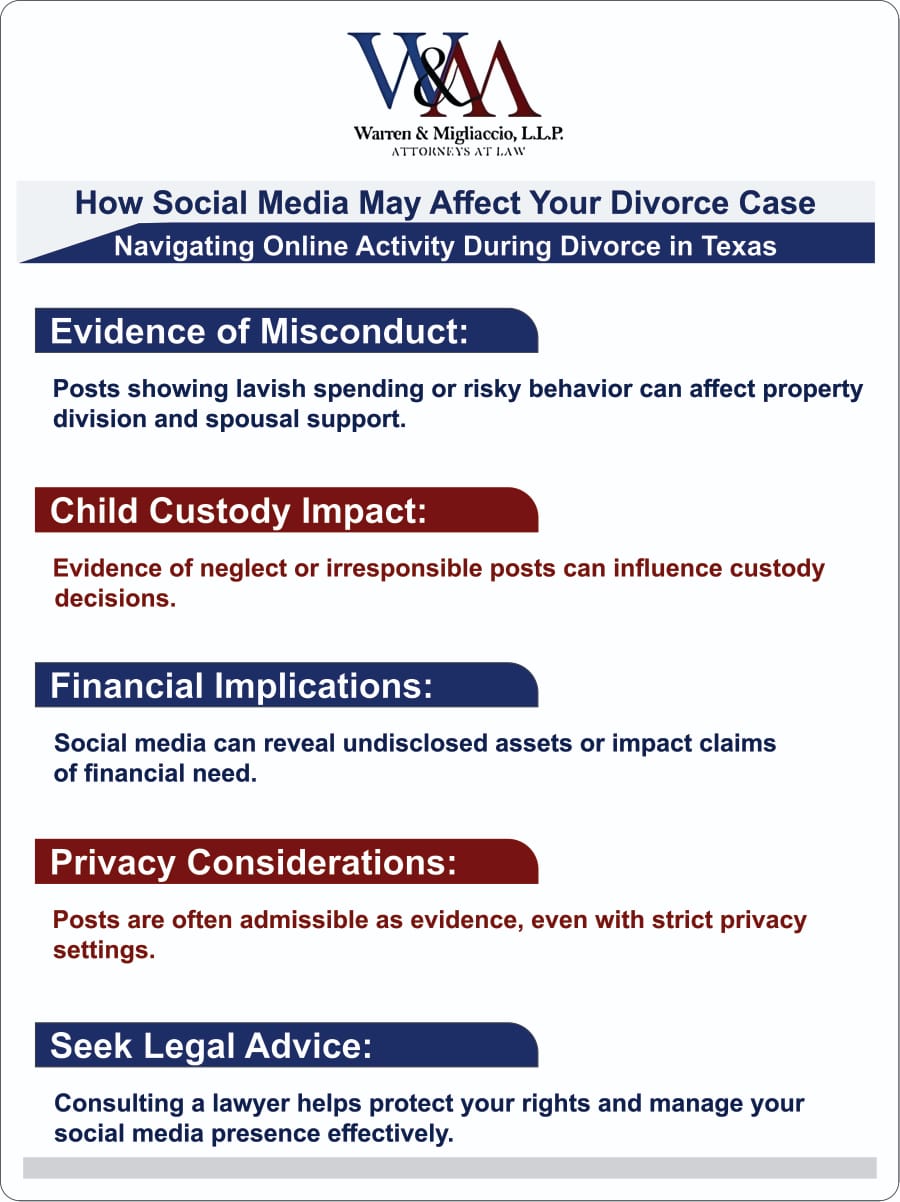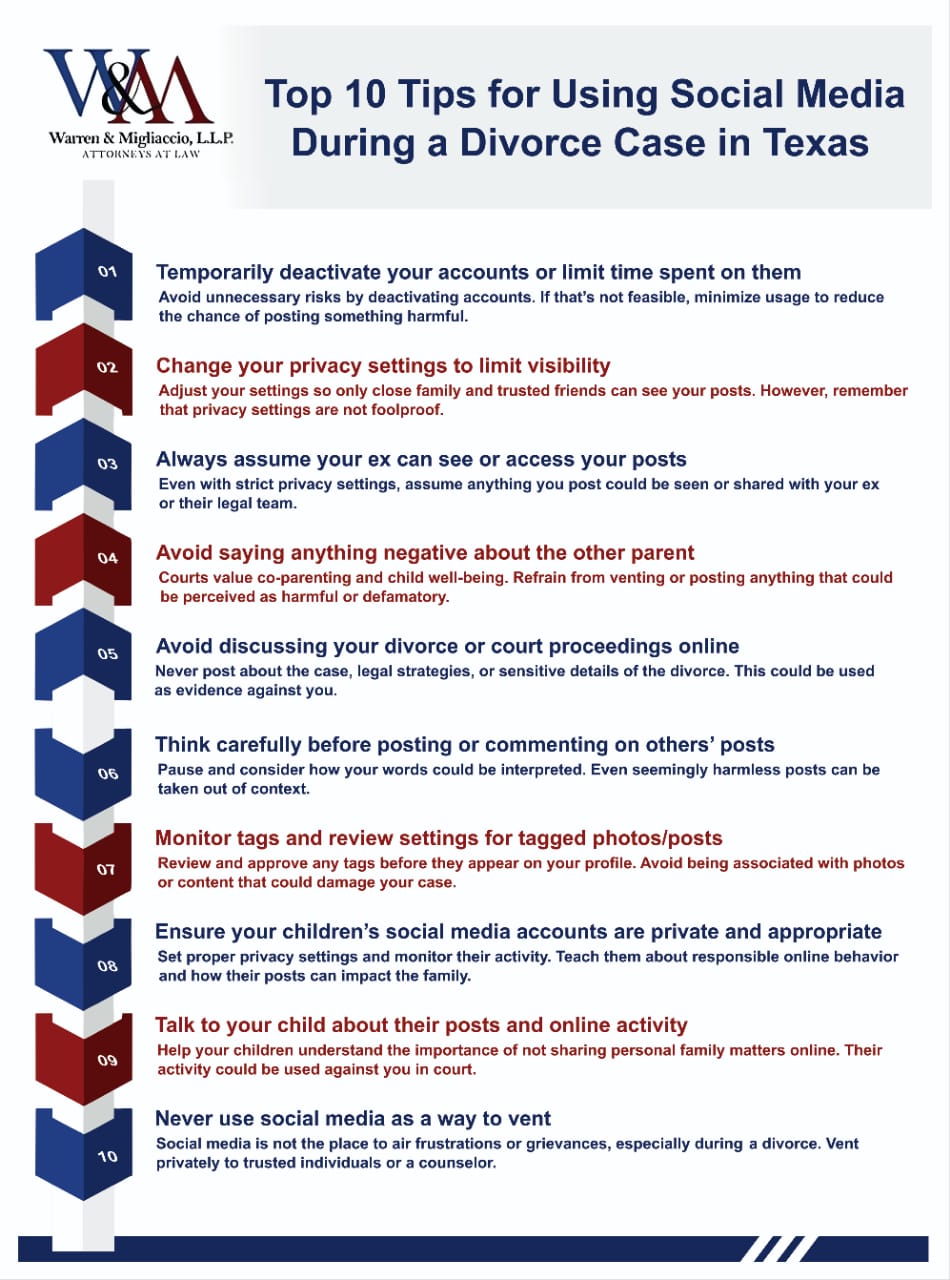How social media may affect your divorce case is a growing concern in the digital age. Many people share their lives online via platforms like Facebook, Instagram, and Twitter. This online activity can unexpectedly impact divorce proceedings. This article discusses how social media can influence your divorce case in Texas and offers advice for safeguarding yourself and mitigating any negative impact from personal injury claims. Consider the evidence relevant to your divorce proceedings and search for the information most relevant to your case.
How Social Media Can Influence Your Texas Divorce
Social media platform offers a window into our lives. We share our thoughts, photos, and experiences, often without a second thought. During a divorce, this seemingly harmless social media activity can become evidence for the opposing party. How exactly does this play out in a Texas divorce case?

Evidence of Misconduct and Lifestyle
Texas is a no-fault divorce state. You don’t have to prove wrongdoing to end your marriage, according to this Texas statute on the grounds for divorce. However, even in no-fault divorces, social media evidence can influence property division, spousal support, and child custody.
Photos of lavish vacations or expensive purchases while claiming financial hardship can undermine your credibility. This is especially true when it comes to community property division and spousal support.
Impact on Child Custody and Support
In Texas, the court’s primary concern in child custody cases is the child’s best interest. Social media post can become pivotal in child custody arrangement and support cases. For example, evidence of neglect, substance abuse, or inappropriate online interactions can hurt your case.
Remember, acting in the best interests of your children extends to your online activity and digital-age decisions.
Financial Implications
Social media posts can reveal marital assets and affect financial matters. These matters include child support and spousal support. For instance, posts boasting about a new job with a higher salary might be used against you to argue for reduced support payments. Conversely, complaining about your financial woes could negatively impact your claim for higher support. This can complicate asset division in divorce cases.
Privacy and Social Media in Divorce
Social media blurs the lines of privacy. Courts generally view social media content as discoverable. There’s little expectation of privacy with social media platform.
Anything you post, even with privacy settings, could be used as evidence in family court. This includes text messages, which are often discoverable in divorce proceedings as part of social media evidence. Be cautious about what you share online, especially during a divorce. Regularly review your privacy settings and consider limiting what you post.

Social Media Evidence: Admissibility in Court
The admissibility of social media evidence in Texas divorce court isn’t straightforward. Authentication is key, as it is with all divorce evidence. It’s crucial to establish the authenticity of social media posts. Your lawyer can help determine how your online presence might influence your divorce settlement.
Avoid deleting posts. This could appear like destroying evidence and hurt your case. Consulting an experienced family law attorney about managing your social media presence is crucial during divorce.
|
Factor |
How Social Media Can Affect Your Case
|
|---|---|
|
Posts about lifestyle |
Pictures of extravagant spending can contradict claims of financial hardship in your divorce case. |
|
Posts about your ex |
Negative posts about your spouse can negatively impact your custody case. |
|
Location check-ins |
These can reveal information about your activities and whereabouts, which could be used against you in divorce court. |
|
Photos with other people |
Photos showing new romantic relationships or reckless behavior might jeopardize certain aspects of the divorce. |
Protecting Yourself on Social Media During a Divorce
Protecting your digital footprint is crucial during a divorce. A judge assumes you’re truthful until proven otherwise. Conflicting data can make the court reconsider case outcomes. Understanding how your social media accounts may affect your divorce case is essential. Limiting access to your online activity can also be beneficial.
Privacy Settings
Review your privacy settings on all social media platforms and limit post visibility. Consider making profiles private. If you regularly share on social media, be mindful of what others see. Even social media sympathy can impact divorce proceedings. Remember, how your life appears to others matters.
Think Before You Post
Pause before posting anything and consider if it could be misconstrued. Avoid posting about the divorce, your spouse, or finances. Your divorce outcome can depend on how social media may affect it.
Avoid Negative Posts
Never post negatively about your spouse or the divorce. This includes direct attacks and passive-aggressive comments. Judges view negativity as damaging to a child’s well-being. Before posting, ask yourself how it might impact family court outcomes. Avoid anything that could negatively affect parental fitness, no matter how innocent it seems.
Preserve Evidence
Don’t delete social media post relevant to the divorce. Courts may view deleted content unfavorably. Save screenshots of relevant posts, including those about your spouse’s spending habits. This can prove financial discrepancies, like claims of hardship alongside a lavish lifestyle. Any post that can influence the outcome should be treated carefully.
Seek Legal Advice
If unsure about posting something, talk to your divorce lawyer. They can help you navigate how social media activity can affect your divorce case. They are a support lawyer in navigating the divorce case as well.

Additional Considerations for Social Media and Divorce in Texas
Consider a few overlooked details. With the stress of divorce, people often forget about online profiles. Your emotions can affect your judgment. This social media activity may significantly affect your divorce case.
Emotional Posts
Avoid emotionally charged posts about your spouse or divorce. These can harm negotiations and appear unprofessional in court. Focus on maintaining a respectful online presence.
Sarcasm and Jokes
Avoid sarcasm or jokes, as intent can be misconstrued. A seemingly harmless comment could be damaging. Be clear and direct in your communication.
Review Past Posts
Review previous posts. Delete anything potentially harmful to your case. This proactive step can save you trouble later.
Dating Site Activity
Consider your activity on dating sites. Content on these platforms may not be appropriate for a courtroom setting. Be mindful of how this activity could be perceived.

Social Media Do’s and Don’ts During Divorce
Assume everything you post online is public. Think carefully before posting anything, and consider the potential consequences. Avoid social media if possible to minimize its effect on your divorce. If usage is unavoidable, follow these best practices to reduce risk. Ways social media can hurt your case can come in the form of domestic violence claims as well. Text messages that document this are important to keep.
| Do | Don’t |
|---|---|
|
|
Frequently Asked Questions
FAQs about How Social Media May Affect Your Divorce Case
Does social media affect divorce?
Yes, social media can significantly affect divorce proceedings. Posts can be used as evidence in financial, child custody, and spousal support disputes.
Does social media affect court cases?
Absolutely. Social media can affect various court cases, not just divorce. Information posted can be admissible evidence in criminal cases, lawsuits, and employment disputes.
Should I delete social media when going through a divorce?
Deleting social media during divorce is generally not recommended. It can be perceived as destroying evidence, which can negatively impact your case. Remember how social media activity may affect your divorce case before deleting anything.
What is the social media clause in a divorce?
Some divorce agreements now include social media clauses. These outline acceptable and unacceptable online behaviors, especially regarding posting about children or the divorce itself. These clauses acknowledge how social media may affect families post-divorce.

Conclusion
How social media may affect your divorce case depends on your online activity and awareness of potential consequences. Be mindful of your online presence. Exercise caution during divorce to protect yourself and your family. Maintaining a clean profile involves more than just deleting comments; consider the impact of your online activity and seek advice from legal professionals, such as a divorce lawyer. Consult a lawyer to navigate alimony-based agreements and protect yourself from divorce settlement problems.
Engaging in social networking sites or social media without care can negatively affect the division of community property and impact child custody decisions. Avoiding Facebook posts about your former spouse is key to avoiding complications and unintended legal consequences in your divorce law case. Be careful using dating sites as information from those may have adverse effects on your case. Avoiding social media postings as divorce evidence altogether can also avoid many complications, as advised by experienced family law attorneys or any law attorneys involved with a custody dispute.
Our experienced family law attorneys in Texas can help you understand the role social media platforms may play in your divorce case. During a consultation, we’ll discuss your unique situation, address your concerns, and offer advice on protecting your rights. Call us at (888) 584-9614 or contact us online to get the support you need during this challenging time.

